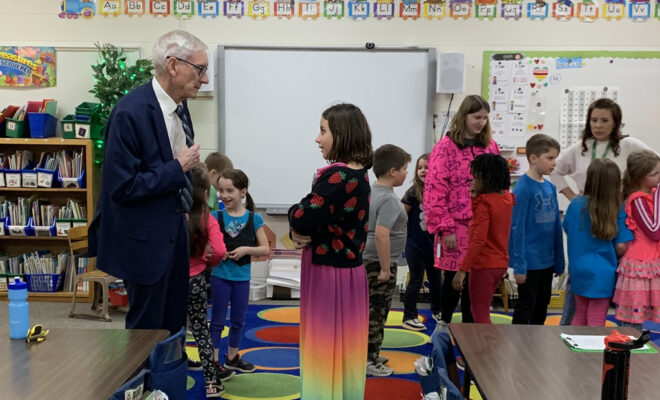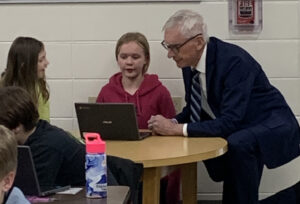Gov. Evers makes stop in Rhinelander

Gov. Tony Evers talks with a fifth grade student at Crescent school March 4. Evers stopped in Rhinelander after signing a bill to increase child care tax credits beginning with the 2024 tax year. Star Journal photo
Talks child care, books, reading at Crescent Elementary
By Eileen Persike
Editor
RHINELANDER – Working Northwoods families with kids in child care will see larger tax credits on next year’s income tax statements.

Gov. Tony Evers signed Assembly Bill 1023, now Act 101, expanding the current child and dependent care credits from 50% of the federal credit to 100% beginning with tax year 2024.
The bill also increases the maximum amount of qualifying expenses that may be claimed from one qualifying dependent from $3,000 to $10,000 and for two or more qualifying individuals from $6,000 to $20,000. Evers said these measures would reduce individual income tax receipts by an estimated $72.9 million annually.
After a stop at Crescent Elementary school in Rhinelander last week, Evers said he is happy to provide the tax relief to working families, but it is not enough.
“It will give some of the parents in the state a good way to lower their taxes but as it relates to the childcare industry it is not enough,” the Governor said. “I was at a place earlier today and I can guarantee you if we don’t get Child Care Counts money directly to those operators they will go out of business and if they go out of business mom or dad would have to stay home and leave the workforce and that would be a bad thing to happen.”
The Child Care Counts program at the Wisconsin Department of Children and Families is part of Evers’ comprehensive workforce plan to “stabilize Wisconsin’s child care industry” and would have provided more than $365 million to help child care providers keep their doors open. As a stopgap measure, Gov. Evers said he directed $170 million in emergency funding to DCF to continue the Child Care Counts Program at current funding levels through June 2025.
While at Crescent school Evers read to students the Dr. Seuss classic, “Oh the Places You’ll Go!” and visited some first grade classrooms.

“The most important thing for me today was not me reading a book, it was in the classroom watching fifth graders who wrote books reading those books to first graders,” Evers said. “Think about the learning that’s going on.”
Afterward, he was asked about book banning that has been in the news around the state.
“Let’s leave that up to the experts in the classroom,” Evers replied. “School people can figure out the morality of a book or whatever. We don’t need that to be messed with at the local level. And every local level actually does have a process, it’s a state law; they go to the superintendent and say, ‘I want this book challenged.’ They have a process and away you go. It shouldn’t be book banning en masse.”
Leave a reply
You must be logged in to post a comment.



